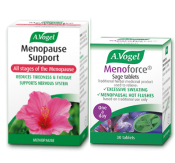An introduction to depression and menopause
Women going through the menopause are four times more likely to suffer from depression than women who are younger than 45. Depression should not be mistaken for anxiety or occasional bouts of sadness, low moods or mood swings, as it is a mental disorder which can lead to further complications and requires the attention of doctors.
It is important to identify the condition correctly, as the term is often used lightly. For example, one might say “I’m feeling really depressed,” when actually what you are experiencing is passing misery about a specific issue such as coming back from holiday, having to visit relatives you don’t like, rather than real depression.
Depression is the feeling of extreme sadness lasting for more than two weeks, often with no specific cause that can be identified, and which interferes with everyday life. Depression can be accompanied by suicidal thoughts. If you are continually feeling worthless and are having changes in your sleeping and eating patterns, these may also be indicators of depression.
If you think that you are suffering from low moods or mood swings due to the menopause follow the link to read information more relevant to your condition.
Why does menopause cause depression?
The menopause is a particularly vulnerable time for women because they are experiencing hormonal changes. It can take your body time to get used to the declining levels of oestrogen and progesterone as you go through this stage of your life.
This may cause a whole variety of menopausal symptoms, including low mood, mood swings or even depression. Once the body has adapted to the hormone shift, many women find their depression lifting.
Aside from hormonal changes, a menopausal woman may experience other factors which can affect their mood such as children leaving home, family loss and grief (both parents or grandparents), or medical conditions such as thyroid dysfunction. It is important to understand what has triggered your low mood or depression to be able to find the most effective treatment for you.
What treatments are there for depression?
Depression is a medical condition which needs to be diagnosed and treated by a doctor. It is important to discuss all of your symptoms, including times that you are particularly prone to feeling down, suicidal thoughts and any personal or family history of depression. Your doctor may refer you to a psychiatrist, psychologist or counsellor.
There is a wide range of drugs and anti-depressants available to treat menopausal depression. Many of these have side-effects and some are more effective for some people than others. You will need to spend time with your doctor to find a treatment suitable for you.
There is also a range of therapies which have proven effects in improving depression. Such therapies include cognitive behavioural therapy (CBT) which works to alter your thinking to help you see things in a more positive light.
If your doctor decides that you are not suffering from depression, but from anxiety, stress or mood swings, the symptoms of which are often confused, then there is a range of treatments, including herbal remedies, available.
What herbal remedies are available?
Depression is a serious medical condition with an increased risk of self-harm and, in principle, should not be managed by self-treatment with herbal remedies. The condition needs the help of a qualified medical practitioner.
However, although some people may say that they are depressed when more accurately, they suffer from low mood or mood swings. If your doctor has decided that you are not clinically depressed, a herb such as St. John’s wort may be of help.
 "They work for me. I no longer feel down or low in mood. I just feel normal."
"They work for me. I no longer feel down or low in mood. I just feel normal."![]()
Read more customer reviews









